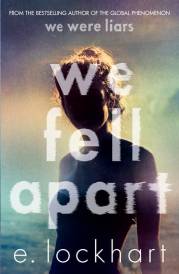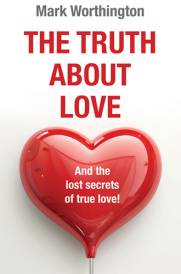Pete Docter Up Interview
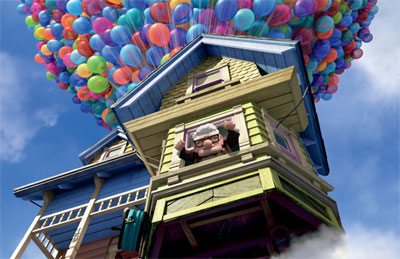
UP, UP AND AWAY FOR DOCTER
EXCLUSIVE Pete Docter, Up Interview by Paul Fischer.When it comes to feature animation, Pixar is adept at crafting stories that cater for children and adults alike. Pete Docter, who directed the classic Monsters Inc and The Incredibles, now tackles old age and regret as dominant themes of his beautifully poetic and funny Up. Perhaps the most emotional films made by the studio, the raves have already begun to pour in and Paul Fischer was privileged to chat to the director in this exclusive interview.
QUESTION: Now very few animated films that deal with old age as a theme, and I'm just wondering where that came from.
PETE DOCTER: Well, actually, it came from Bob Peterson and myself just kind of making a list of things that we wanted to play with, in our films. And a grouchy old man seemed like a really appealing and funny character, just because - you know, the way we were drawing him and kind of visualizing him early on was really grouchy and sour and angry, and "get off of my lawn" kind of guy, which we hadn't done before. And it seemed like it offered a lot of opportunity for comedy just in character-based stuff. So, we really approached it kind of from a gag-slash-comedy, humor kind of angle. But as we got into it, we realized that there was a great deal of emotion that came with that, that - you know, looking back on a life, and the highs and lows of his experience and missed opportunity, and so on - it really became a strong part of the film in that way as well.
QUESTION: Is it challenging to develop a character with that much emotional depth, within the constraints of feature animation?
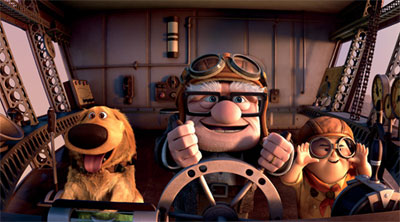 PETE DOCTER: Well, I think it's a challenge regardless of the medium, even in live action. And it's something that - you know, we're always looking for and something I admire in films that I still remember as being my favorites growing up, and even now as adults. You know, films that have that great balance of humor and adventure, and yet also drama and emotion, on the other side. So, you know, I think it's what really sticks with you, that makes you feel those films, and think about them later. Is when you can find something that's relatable and identifiable. And you know, what's funny, as we developed the film, we realized that even though we'd chosen an old man, that aging wasn't really so much the issue as regret, and a feeling that Carl had messed up in some way, because he never got to go on this adventure. He feels like he was a failure as a husband. But, of course, realizes throughout the journey that he actually had the greatest adventure. He didn't even need to go on this travel adventure. His greatest adventure was this relationship with his wife. And so - you know, in some sense, we were sort of - and I bring this up only because we initially were sort of - pulled ourselves into a direction of really emphasizing age thematically, through months, especially. But we realized that it's not - it was a unique opportunity to play with some stuff, both emotionally, as I say, but also humor-wise. Yet wasn't that central to that main theme, you know what I mean?
PETE DOCTER: Well, I think it's a challenge regardless of the medium, even in live action. And it's something that - you know, we're always looking for and something I admire in films that I still remember as being my favorites growing up, and even now as adults. You know, films that have that great balance of humor and adventure, and yet also drama and emotion, on the other side. So, you know, I think it's what really sticks with you, that makes you feel those films, and think about them later. Is when you can find something that's relatable and identifiable. And you know, what's funny, as we developed the film, we realized that even though we'd chosen an old man, that aging wasn't really so much the issue as regret, and a feeling that Carl had messed up in some way, because he never got to go on this adventure. He feels like he was a failure as a husband. But, of course, realizes throughout the journey that he actually had the greatest adventure. He didn't even need to go on this travel adventure. His greatest adventure was this relationship with his wife. And so - you know, in some sense, we were sort of - and I bring this up only because we initially were sort of - pulled ourselves into a direction of really emphasizing age thematically, through months, especially. But we realized that it's not - it was a unique opportunity to play with some stuff, both emotionally, as I say, but also humor-wise. Yet wasn't that central to that main theme, you know what I mean?QUESTION: I found the film very moving so I'm just wondering whether or not you look at what the adult audience will get from this movie, as opposed to the primary target audience of children.
PETE DOCTER: Definitely. Definitely. I mean, there's a quote from Walt Disney somewhere, where he talked about - you know, a similar question was asked. And he said, "Well, we don't make our films for children. We don't make them for adults. We make them for the child in every adult, that maybe the world has made you forget about. But we hope our films can help you remember." And I think that's the case for us, as well. We definitely go for that emotional hook. That's something we're looking for very early on. And then later, as the film develops, you can add all sorts of comedy and humor and slapstick and things that I think appeal to children. So, you have these various layers. And watching this film with an audience, it's fun, because you hear different reactions throughout the film. You know, adult laughs versus kid laughs, at different places in the movie. And that's really cool.
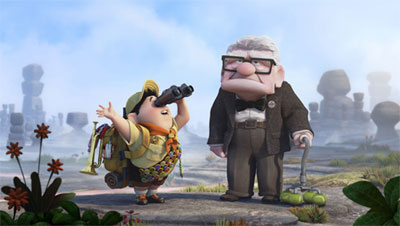 QUESTION: What also struck me about this is that the technology of the 3D never takes over from the narrative, or from characterization - something which I really hated about a lot of the 3D animated films we've seen from other studios - and I won't mention any names. So how important is it for you that the technology not be seen as anything that somehow overpowers the viewer.
QUESTION: What also struck me about this is that the technology of the 3D never takes over from the narrative, or from characterization - something which I really hated about a lot of the 3D animated films we've seen from other studios - and I won't mention any names. So how important is it for you that the technology not be seen as anything that somehow overpowers the viewer.PETE DOCTER: Well, first of all, thank you. That's exactly what we were hoping for. And it kind of stems from even our approach on Toy Story, way back in whenever that was. Early '90s. That we realized, "Okay. As cool as we think computer animation is, and how eye-catching it is, that really only sustains an audience for a limited amount of time." And what takes you through the film and sustains your interest in the story, and the characters." And so that's always our primary focus. And if you ever get the sense that a movie is selling 3D first, and then the story second - you know, I think that's where you run into trouble. And so we really tried to use - you know, we wanted this to be a movie about Carl Frederickson, that happens to be in 3D. Not a 3D movie about Carl Frederickson.
QUESTION: But you didn't start out doing this as a 3D movie, did you? I mean, was that something that came later, the idea of turning it into a 3D movie?
PETE DOCTER: Yeah, it was. We were kind of partway along already in crafting the story. We were just thinking of it as a traditional film. And we really approached it that way throughout the making of it. You know, we have a separate group of 3D-a stereoscopic group that focused on creating the 3D version. But other than that group and the sort of occasional movies we'd have to talk about how to use it emotionally, it didn't affect the way we make our movies. We still thought of them in terms of, what is the story point here? How best to use the camera, the lighting, everything, to sell or to communicate what we're talking about.
QUESTION: Tell me about the way that technology has changed. I mean, could you have made this film, do you think, five years ago, perhaps? Or ten years ago?
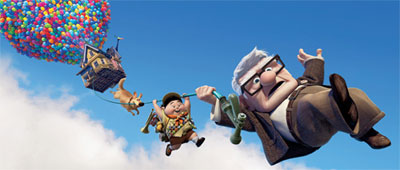 PETE DOCTER: Ten years ago, no. Five years ago, it would have been a real challenge. I mean, I think right around the area - Incredibles seemed to be - for humans, for things like cloth, these various technical challenges, was a real breakthrough in terms of being able to do that, as well as the scope of it. You know, the number of characters, and costume changes and things. So, you know, I'd have to point primarily at cloth as being a big stumbling block. Also things like skin, and the way the characters are articulated. That's all stuff that - you know, this being our tenth film, we've developed over the years, and that we get to piggy-back on, and really benefit on.
PETE DOCTER: Ten years ago, no. Five years ago, it would have been a real challenge. I mean, I think right around the area - Incredibles seemed to be - for humans, for things like cloth, these various technical challenges, was a real breakthrough in terms of being able to do that, as well as the scope of it. You know, the number of characters, and costume changes and things. So, you know, I'd have to point primarily at cloth as being a big stumbling block. Also things like skin, and the way the characters are articulated. That's all stuff that - you know, this being our tenth film, we've developed over the years, and that we get to piggy-back on, and really benefit on. QUESTION: Can you compare the Monsters experience with this experience? Are they vastly different?
PETE DOCTER: They were pretty different. I mean, the basic process is the same. And obviously the studio is the same, though it's changed somewhat over the years as its grown. It's kind of inevitable. But - you know, there were a lot of things that have changed in the - over the years. I think Monsters was tricky, in that it was the first film that John wasn't directing, and kind of everyone was finding their footing as how that would go down. And at the time, did Disney trust that anybody else but John could pull that off? And all of that. So, there was a lot of testing, and a lot of checking, and so on-- that on this film, myself and the rest of the team were left alone to kind of do our work a little bit more. And that was great.
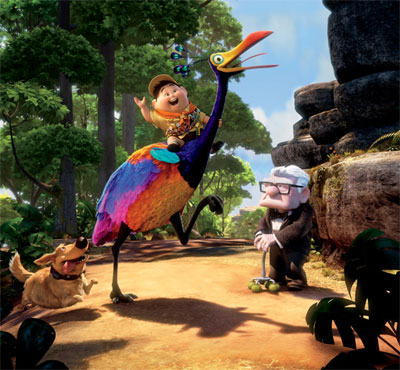 QUESTION: Do you know what you're going to be doing next? Or do you take a long break now?
QUESTION: Do you know what you're going to be doing next? Or do you take a long break now?PETE DOCTER: Yeah, I'm gonna take a break. I've got some ideas, but it's nothing I'm ready to talk about.
QUESTION: And why no Mike Wazowski at the closing credits?
PETE DOCTER: [LAUGHTER] On this film?
QUESTION: Yeah.
PETE DOCTER: Well, it's not his movie. He'll have to wait.
QUESTION: I know, but didn't you, in previous movies, have little characters propping up from other movies over the closing credits?
PETE DOCTER: Yeah, I know. We really wanted to keep sort of the reality of this world intact, you know? And keep it all sort of inclusive just to this film.
QUESTION: Will there be another Mike Wazowski movie, do you think?
PETE DOCTER: Well, I mean, the way we've always approached these is just, you know, if we come up with an idea that we feel like really bears doing, then we will. So, we'll see.
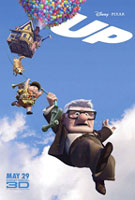
Up
Starring: Ed Asner, Jordan Nagai, Christopher Plummer, John RatzenbergerDirector: Pete Docter
Genre: Animated, Adventure, Theatrical Release, Family (General), Disney Film, Animation, Comedies
From DisneyoPixar comes Up, a comedy adventure about 78-year-old balloon salesman Carl Fredricksen, who finally fulfills his lifelong dream of a great adventure when he ties thousands of balloons to his house and flies away to the wilds of South America.
But he discovers all too late that his biggest nightmare has stowed away on the trip: an overly optimistic 8-year-old Wilderness Explorer named Russell.
From the Academy Award-nominated director Pete Docter (Monsters, Inc.), DisneyoPixar's Up invites you on a hilarious journey into a lost world, with the least likely duo on Earth. UP will be presented in Disney Digital 3-D in select theaters. -
MORE



